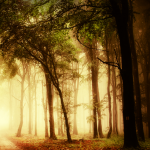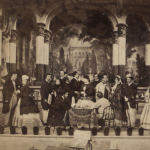The Return of the Trees
Posted on May 23, 2014 by Robert Ringer
Finally, the trees are back — my trees. The trees have once again shut off the outside world from my veranda. Almost makes me feel like a modern-day Thoreau, except he couldn’t see a golf course in the distance.
The global cooling of winter seems to have treated my trees well, and they appear anxious to enjoy the global warming of summer. As far as I can tell, only a few branches have failed to resuscitate their leaves, so I’m happy to report that I lost very few foliage friends over the winter.
Yesterday, in the early evening, my trees were in one of their talkative moods. You are aware that trees talk to you, are you not? Trust me, they do … and sometimes they do so in a whisper.
Trees tease and tantalize. They call out to you. And when a soft breeze blows, they can be downright sensuous. When my trees return every spring, it’s like reigniting an old love affair.
It’s hard to imagine how anyone can look at a tree and believe that the universe is nothing more than one big cosmological accident. I believe that such a thought reflects cognitive dissonance— i.e., a conflict between what we want to believe (that we are not subject to a Higher Power) and what we know, through common sense and intuition, to be true.
It’s quite interesting that trees have played such an important role in human spiritual history — the Persian Tree of Immortality … the Bodhi Tree (or Tree of Awakening) that shaded Buddha for forty-nine days as he achieved enlightenment … the Hebrew Tree of Knowledge that proved to be the downfall of Adam and Eve (and mankind?).
Twentieth century German poet, novelist, and Nobel Prize winner Hermann Hesse poetically described trees this way:
[Trees] are like lonely persons. Not like hermits who have stolen away out of some weakness, but like great, solitary men, like Beethoven and Nietzsche. …
Trees are sanctuaries. Whoever knows how to speak to them, whoever knows how to listen to them, can learn the truth. They do not preach learning and precepts, they preach, undeterred by particulars, the ancient law of life. …
When we are stricken and cannot bear our lives any longer, then a tree has something to say to us: Be still! Be still! Look at me! Life is not easy, life is not difficult. Those are childish thoughts. …
So the tree rustles in the evening, when we stand uneasy before our own childish thoughts: Trees have long thoughts, long-breathing and restful, just as they have longer lives than ours. They are wiser than we are, as long as we do not listen to them.
But when we have learned how to listen to trees, then the brevity and the quickness and the childlike hastiness of our thoughts achieve an incomparable joy. Whoever has learned how to listen to trees no longer wants to be a tree. He wants to be nothing except what he is. That is home. That is happiness.”
Would that I could have written this.
In a strong wind, my trees are apt to toss about in a frenzy. But yesterday, they swayed softly in a gentle, cool breeze — soft and soothing instead of frenzied and excited.
After all the wars have been fought, after all the governments have still not succeeded in totally enslaving the human race, after all the technological progress has failed to solve the world’s problems or prove that there is no God, nature will have its way. As in “Life After People,” when the human race is no longer here, the trees and their leafy relatives around the globe will swallow up every building, every bridge, every work of art … every trace of mankind.
And after a series of global warmings and global coolings, the earth will, like all other matter in the universe, end its life as a lonely ball of ice, spinning around a dying star. Then what? Perhaps, as some scientists have suggested, a quantum fluctuation will tear every atom in the universe apart, and everything — including the atoms of our own dusty remains — will reunite with the Conscious Universal Power Source.
But that’s another discussion for another day. Right now, there’s a tree not far from you. Take a good, long look at it — and be sure to listen carefully. What you see and hear will clear your mind and cleanse your soul in a way that will make you appreciate the fact that you are the only collection of atoms that can reflect on the world around you, as well as on the whole universe.










